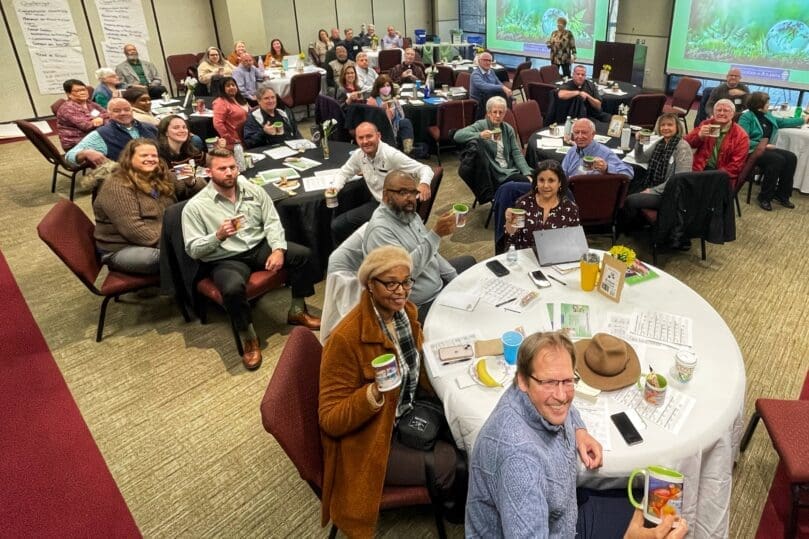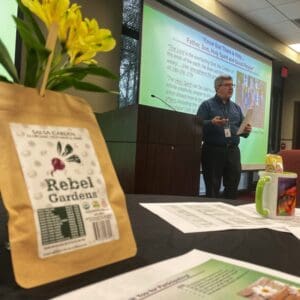 Photo by Andrew Nelson
Photo by Andrew NelsonSmyrna
Growing number of parishes, schools embrace environmental cause
By ANDREW NELSON, Staff Writer | Published February 2, 2023
SMYRNA—Outside St. Francis of Assisi Church, a garden with native Georgia flowers replaced a barren patch of soil. To support butterfly and bee habitats, a group of volunteers planted joe-pye weed and other flowering plants.
This was one of the first projects for the nine-member Care for Creation team at the parish.
The garden at the Blairsville church supports and maintains pollinators with pollen and nectar so these insects stay in the area to keep pollinating crops and enhance local biodiversity.
The parish is one of the newest members of the Laudato Si’ Initiative in the Archdiocese of Atlanta. The parish sits about 100 miles north of Atlanta in rural Union County.
Frances Mason, who is retired from the U.S. Forest Service and leads the team, said installing the garden put the environmental ministry in front of parish members.
“None of us in the Laudato Si’ group are really gardeners, but we wanted to do something visible,” said Mason.
Savings going to parishes, schools
The parish was one of more than 20 parishes and schools to share strategies and learn from each other at a Jan. 25 workshop in Smyrna as part of the initiative to care for the environment.

Brian Savoie, the sustainability program coordinator for the Archdiocese of Atlanta’s Laudato Si’ Initiative, leads a workshop Jan. 25 for parish and school representatives to exchange ideas. Photo by Andrew Nelson
From implementing a waste-zero parish picnic to understanding where to find the money to pay for improvements to cut water use, the groups exchanged experiences to improve caring for the planet, following the leadership of Pope Francis’ environmental encyclical, Laudato Si’.
“It’s amazing how many ways you can just take one step,” said Brian Savoie, the sustainability program coordinator. The effort is part of the work of the Archdiocese of Atlanta’s Office of Life, Dignity and Justice.
Since the 2015 papal encyclical’s release, scientists and leaders in the archdiocese have designed a road map to implement best-practices on the environmental front. The plan has been adopted by other dioceses to guide work elsewhere. Two years later, a dozen parishes and schools performed an energy and water audit. Now, some 30 parishes and schools have signed on to reduce water, energy and waste.
“We are just getting started. It’s great how much we have accomplished. We have much more to grow,” said Savoie. Many people are committed to this effort and can see the progress as they respond, he said.
He said programs can see “real savings” from their investments. St. Mary School, Rome, for example, paid $10,000 to replace fluorescent lights with LED lights, paid off the project in two years and has saved some $4,500 yearly since. School officials report a 50% reduction in energy use in the gym over two years, and in the school, about 15%.
At Kennesaw’s St. Catherine of Siena Church and School, a similar project with a new heat management system, is seeing an annual savings of more than $16,000. Greenhouse gas emissions have dropped some 11%.
By the end of the decade, a goal of with the Atlanta Laudato Si’ Initiative is to “create a culture of conservation” across the archdiocese and reduce energy and water consumption by 25% and landfill waste by 50%.
Atlanta Archbishop Gregory J. Hartmayer, OFM Conv., opened the day’s conference at the Chancery of the archdiocese.
It’s a contradiction how people have turned to the earth for sustenance and relaxation, but the world has also been abused, he said. The archbishop reminded the group how they need to encourage changing attitudes and aid conservation by acting locally, seeing their parish as resources to make an impact.
This work on behalf of the planet is not to aim for immediate results, he said, but for the betterment for generations who are not born yet.
A 2011 study by the Environmental Protection Agency found houses of worship could lower their energy use up to 30 percent by implementing energy efficiencies.
There may be new help for that. Federal funding in the Nonprofit Energy Efficiency Act will allow houses of worship and nonprofits to apply for grants. The $50 million will be overseen by the Department of Energy, with each entity eligible for a grant of up to $200,000.
Parish ministries make Laudato Si’ visible
A church picnic or fish fry can be an environmental success story, with the proper planning and mindset, said Jay Bassett, who had worked at the federal Enviromental Protection Agency.
Bassett, who attends St. John Neumann Church in Lilburn, said he encourages parishes to rethink special events to save money by reducing waste. Excess trash shows inefficiency, which can be pricey to pay for items off the shelf and then having to pay to have it hauled away, he said. It’s better to cut waste with planning instead of hoping to lean on recycling, he said.
In Blairsville, Mason and the team did not stop with the garden. It also manages a recycling program at the parish, first only collecting paper but expanding to include cardboard, aluminum and other items. A ministry member is responsible to take the collections to the local transfer station.
The group is helping other ministries by pitching in to wash dishes after funerals and other events, said Mason. Changing people’s mind takes time to develop and for new habits to form so the parish moves in small steps to change behavior, she said.